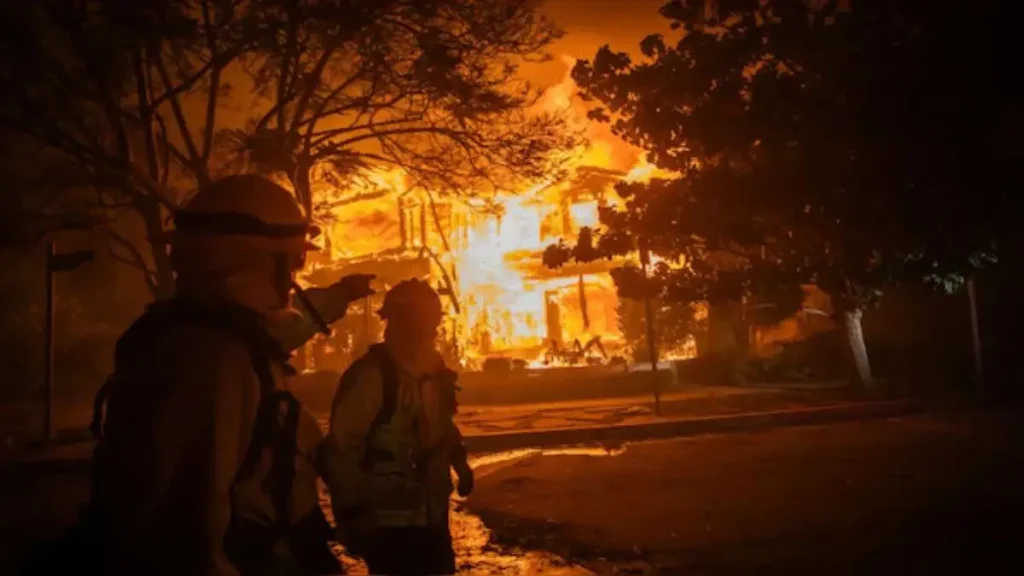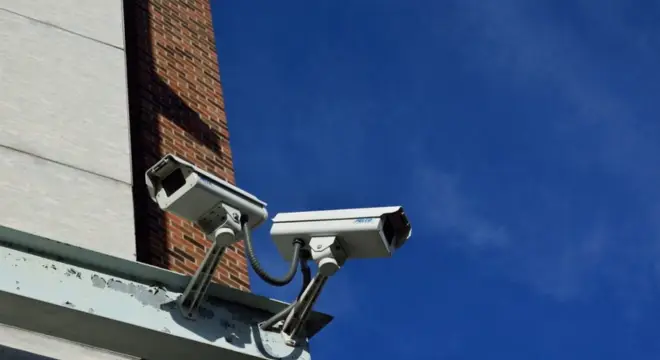Vacant Home Turns into Disaster Zone in LA – The Real Cost of Neglect
Vacant properties present significant security risks that can lead to serious consequences, not just for the homeowners but also for the surrounding community. Whether it’s a house that has been abandoned or one that’s temporarily unoccupied, these properties can become prime targets for squatters, vandalism, and other illegal activities.
The unfortunate incident of a vacant Hollywood home being overtaken by squatters, which ultimately led to the property being destroyed in a fire, highlights the vulnerability of unprotected homes.
This article will explore the security risks associated with vacant homes, the negative impact these incidents can have on neighborhoods, the legal challenges homeowners face, and, most importantly, how to prevent such events from happening in the first place. By learning from recent incidents like the Hollywood squatter case, homeowners can take the necessary steps to protect their properties.
Home Security Risks of Vacant Properties
Vacant homes are particularly vulnerable to security threats due to their lack of attention and upkeep. When a property is left unoccupied for extended periods, it becomes an inviting target for squatters, thieves, and vandals. Squatters, in particular, can take advantage of a vacant property by entering and occupying it without the owner’s permission, leading to potential damage, theft, or even illegal activities.
Many vacant homes also suffer from the simple fact that they are not maintained. Overgrown lawns, broken windows, and uncollected mail are all signs that the property is not being watched or secured. These visible cues signal to potential intruders that the property is ripe for occupation or exploitation.
In the case of the Hollywood property, squatters illegally entered the house, which had been vacant for some time. The lack of security allowed squatters to occupy the home and engage in unlawful activities.
Eventually, the situation led to a fire that caused the house to be demolished. This incident serves as a glaring reminder of the importance of maintaining the security of vacant homes to prevent such outcomes.
News Update: Hollywood Squatter Incident

A vacant home in Hollywood recently became the focal point of a security nightmare when squatters took over the property, ultimately causing a devastating fire. According to a report by KTLA, the squatters gained access to the home, likely through unsecured doors or windows, and set up temporary residence.
During their stay, the property was left unprotected, allowing further damage to occur, culminating in a destructive fire that led to the complete demolition of the house.
This incident has garnered attention as a stark example of the risks posed by unoccupied properties. The squatters’ presence not only endangered the property itself but also put the entire neighborhood at risk.
The fire’s spread could have potentially harmed nearby homes or caused other safety hazards. The case of this Hollywood home emphasizes how vulnerable vacant properties are and the importance of taking proactive steps to prevent such situations.
The KTLA article points out how the vacant property’s lack of security measures—such as secure doors, windows, and a monitoring system—allowed the squatters to gain access and ultimately destroy the house. This serves as a reminder that when homes are left unoccupied, they become targets for all kinds of criminal activity, with potentially disastrous results.
Impact on Neighborhood Safety
Effects on Local Communities
When a vacant home becomes the target of squatters or other illegal activities, the repercussions extend beyond just the property owner. In the case of the Hollywood incident, the effects were felt throughout the surrounding community. Squatters can introduce not only criminal activity but also a general sense of insecurity for neighbors.
Vacant homes, especially those that attract squatters, often lead to increased crime rates in the area. Once a property is occupied by unauthorized individuals, it can serve as a breeding ground for illegal activities such as drug use, theft, and vandalism.
Neighbors may feel unsafe, fearing that such criminal behavior could spill over into their own properties. Furthermore, the presence of squatters can lower property values, as potential buyers or renters may shy away from living in a neighborhood with unregulated, dangerous properties.
The psychological impact on nearby residents can be significant. People feel uneasy knowing that an abandoned house nearby is unprotected, potentially acting as a hotspot for criminal behavior. This feeling of vulnerability can lead to a decline in community morale and trust.
Neighborhood’s Reputation
The perception of an area can also be damaged when vacant properties are not secured. Homes left unsecured can quickly become eyesores, attracting unwanted attention and reducing the overall appeal of a neighborhood. This can further hinder efforts to revitalize or sell properties in the area, exacerbating the issue of urban decay.
Using the Hollywood example again, the squatters’ activities, coupled with the resulting fire, disrupted the entire neighborhood. The fire could have easily spread to other properties, creating an even more dangerous situation for residents. Such incidents are a wake-up call for homeowners and city authorities to take action in securing vacant homes and protecting the broader community.
For additional insights into property security and potential risks, check out our article on how ICE agents raided the wrong Oklahoma home, forcing a family out without notice—demonstrating the importance of knowing your rights and securing your property effectively.
Legal and Policy Implications
Property owners face numerous legal challenges when trying to reclaim their property from squatters. The process can be lengthy and difficult, especially if squatters have occupied the home for a prolonged period.
- Adverse Possession Laws: In some cases, squatters may gain legal rights to the property after living there for a certain time, depending on local laws. This can make it difficult for homeowners to remove them without legal proceedings.
- Eviction Process: The eviction of squatters often requires a court order, which can take weeks or months. During this time, the property remains exposed to further damage.
- Cost of Repairs: Homeowners often face significant repair costs after squatters have occupied their property. These costs can include cleaning up debris, fixing structural damage, and replacing stolen or damaged items.
Role of Local Governments
- Property Laws Enforcement: Local governments play an important role in regulating vacant properties and ensuring that owners take responsibility for securing their homes. Inconsistent enforcement of laws may leave properties vulnerable to squatting.
- Improvement of Policies: Stronger regulations are needed to protect homeowners from squatters. These could include requiring landlords and property owners to ensure vacant properties are properly secured to prevent unauthorized access.
In the Hollywood case, the legal implications were vast, affecting both the homeowners and local authorities. The fire that ultimately destroyed the home added a layer of complexity to the situation, highlighting the need for effective laws to prevent squatters from gaining access to vacant properties. Homeowners are encouraged to work closely with legal professionals and local authorities to navigate these challenges and ensure their properties remain secure.
Preventative Measures for Homeowners

Homeowners can take several steps to secure vacant properties and avoid squatters. These actions not only prevent unauthorized entry but also save time and money in the long run.
- Install Security Systems: Use cameras, motion detectors, and alarms to monitor the property remotely and deter criminal activity.
- Secure Doors and Windows: Reinforce entry points with sturdy locks, deadbolts, or security bars to make unauthorized entry harder.
- Regular Inspections: Check the property regularly or hire a property manager to ensure no one has gained access.
- Property Maintenance: Keep the lawn mowed, the mailbox clear, and the home’s exterior in good condition to avoid attracting squatters.
- Signage: Display security warning signs to let potential squatters know the property is being monitored.
Taking these measures helps ensure the property remains secure and reduces the likelihood of squatter issues.
How Homeowners Can Protect Their Communities
Homeowners have a role in maintaining their property’s security and protecting their neighborhood. Here are some key actions:
- Neighborhood Watch Programs: Work with neighbors to monitor vacant homes and report suspicious activity.
- Collaborate with Authorities: Engage local law enforcement to ensure vacant property laws are enforced and advocate for stronger security measures.
- Educate the Community: Raising awareness among neighbors about the risks posed by vacant homes helps everyone stay vigilant.
- Vacancy Registration: Participate in local government programs to register vacant properties for quicker responses from authorities.
By securing their homes and working together with their community, homeowners can reduce crime and enhance neighborhood safety.
Conclusion
Vacant properties are vulnerable to a wide range of security risks, as demonstrated by the recent Hollywood incident. Squatters can cause significant damage, not only to the property itself but also to the surrounding neighborhood’s safety and property values.
Homeowners must take proactive steps to secure their vacant properties, from installing security systems to maintaining the property’s exterior. Working with local authorities and staying informed about legal protections can further ensure that these homes are safeguarded against unauthorized occupation and other risks.
If you own a vacant property, take action today to secure it and protect both your investment and your community. Visit our website for expert advice on home security, property maintenance, and ways to prevent squatter incidents.
Disclaimer: The information provided in this article is for general informational purposes only. It does not constitute legal advice, and homeowners are encouraged to consult with professionals or local authorities regarding the specifics of securing vacant properties in their area.


